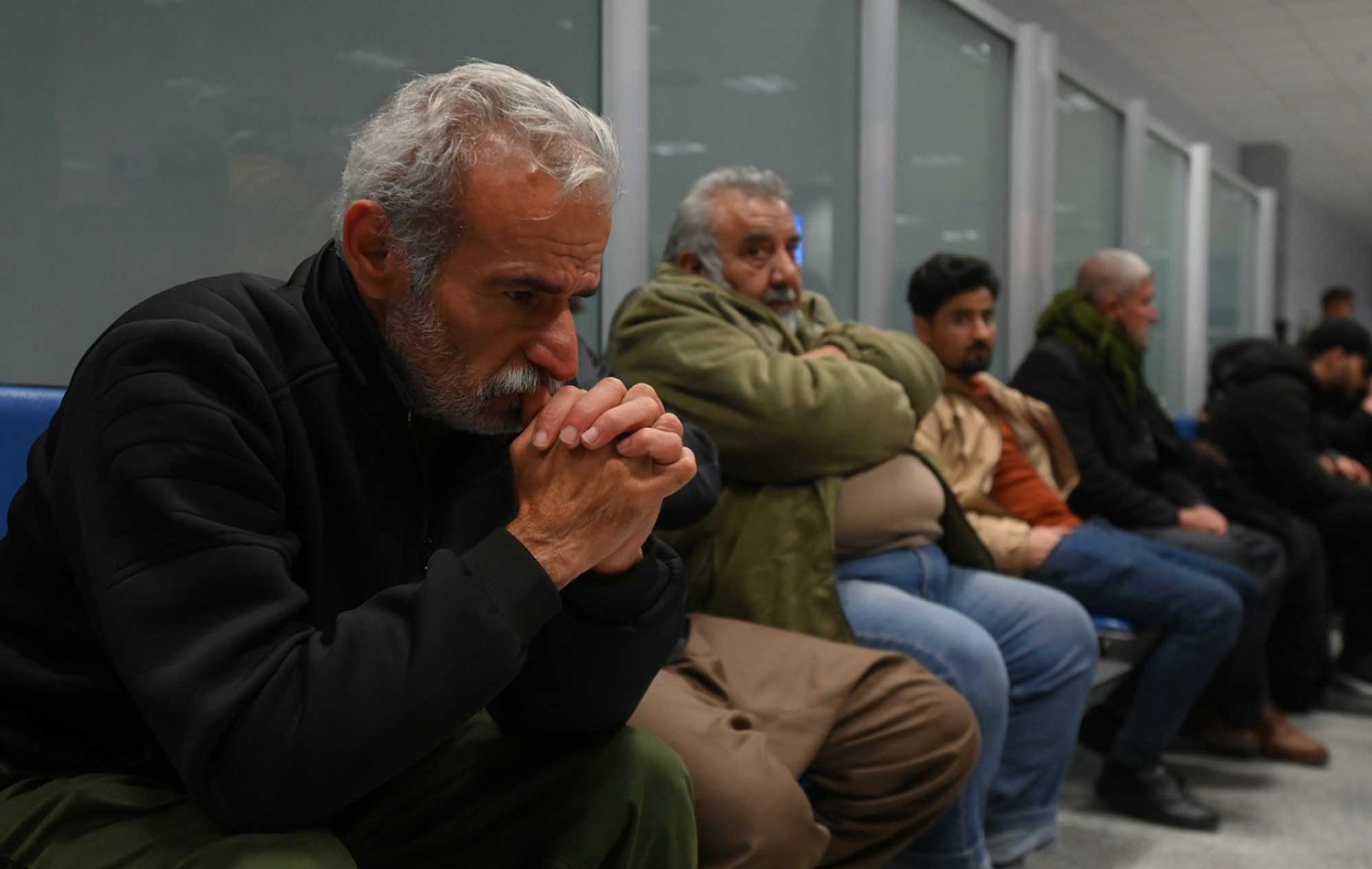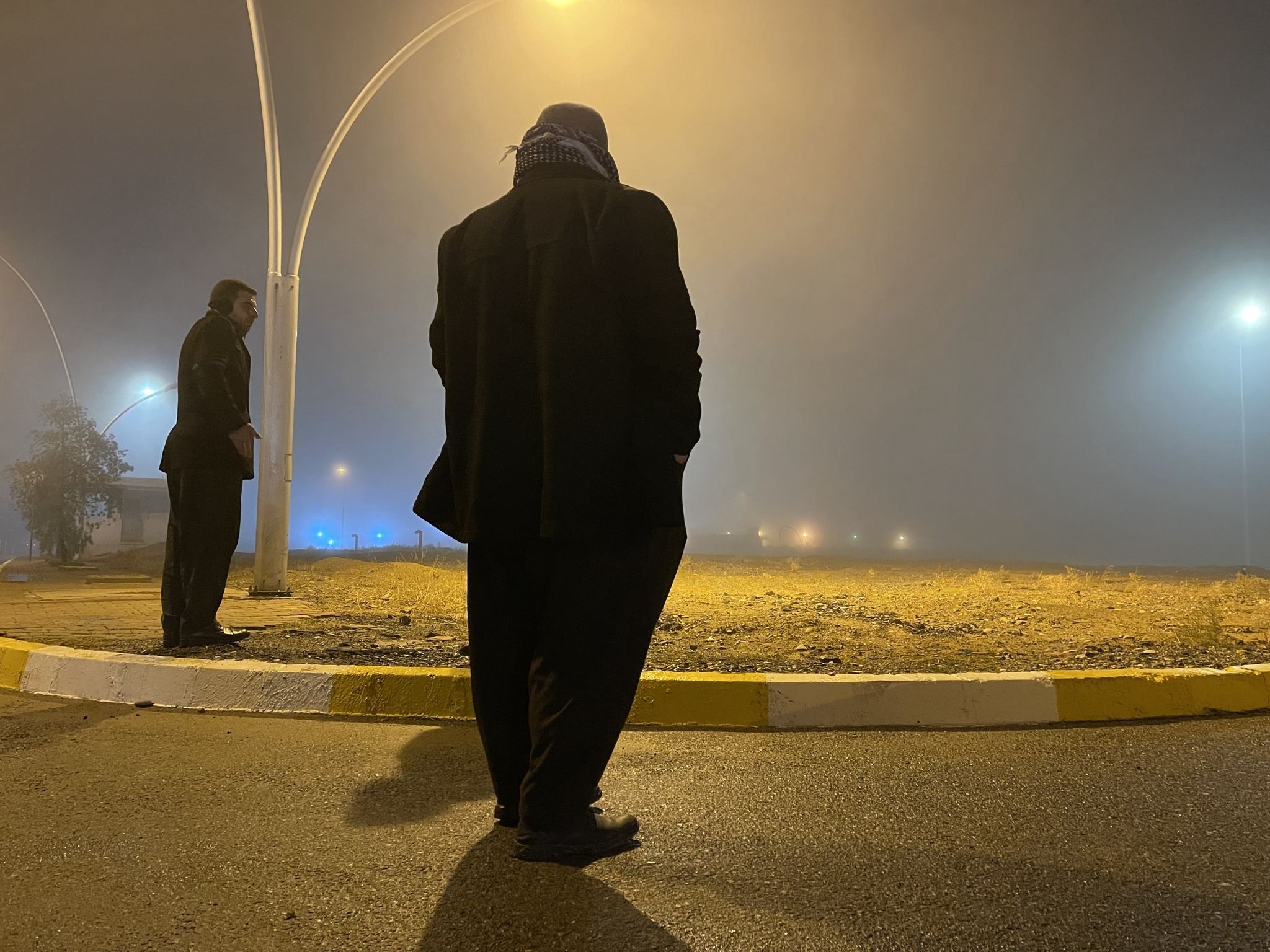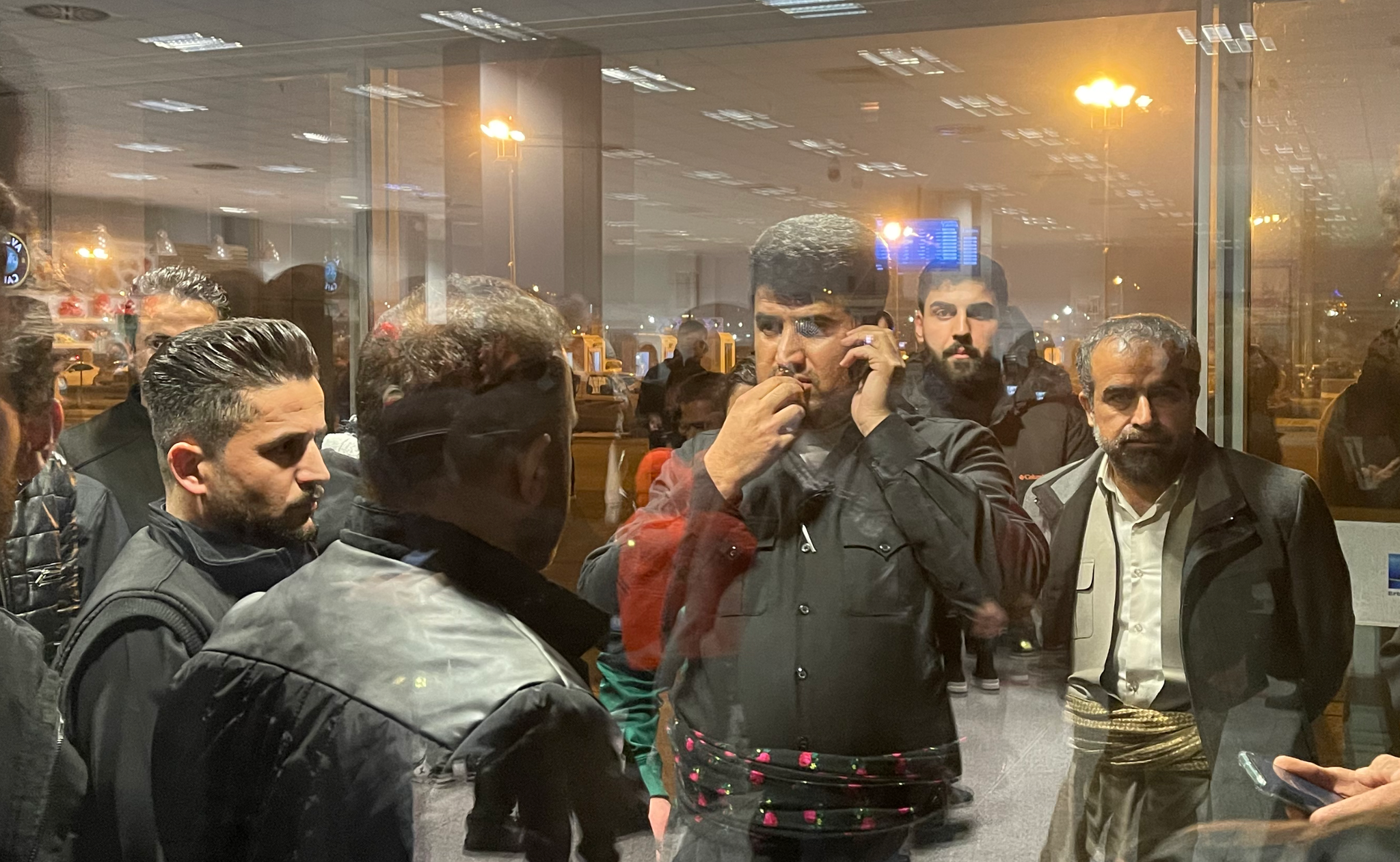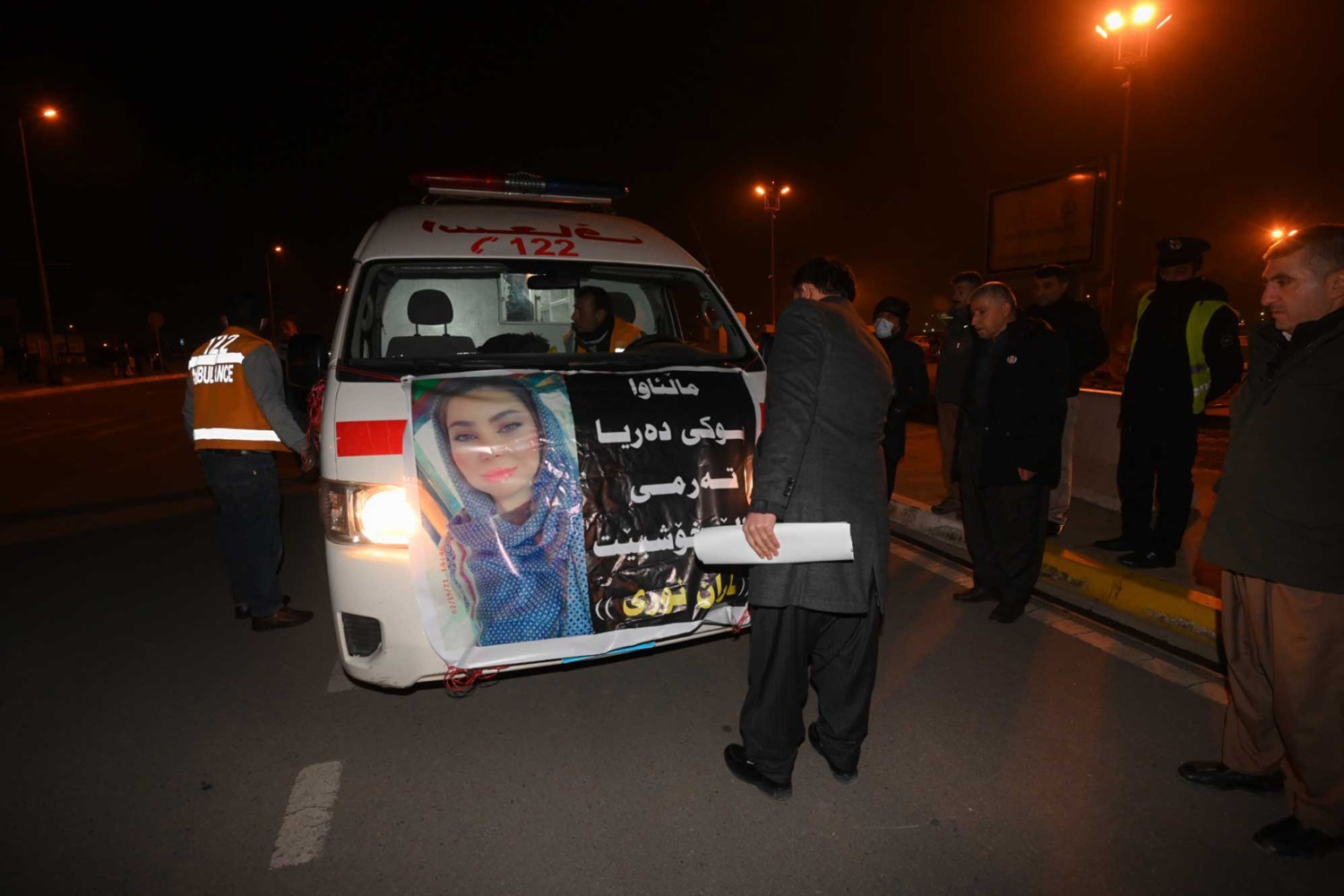ERBIL, Kurdistan Region - It is a cold winter’s night, and around a hundred women dressed in black are sitting on metal chairs among an equal number of men on their feet in the arrival hall of Erbil International Airport, all waiting for the coffins of their loved ones in the cargo of an aircraft traveling from France to the Kurdistan Region to arrive.
The arrival lounge of the Kurdistan Region’s main airport often witnesses warm reunions, but in the early hours of Sunday morning it is engulfed in agony as families count the minutes until the plane repatriating the corpses of 16 Kurdish migrants drowned in the English Channel last month lands.
Some doze off in the harsh space, while others twiddle their fingers as they swim back into the memories of their loved ones, now lying in coffins in the cargo of an aircraft gliding its way to their homeland. Thick clouds of grief immerse the hall like a canopy.
Hangavan, 20, quietly stares at the devastated mothers, shattered fathers, and broken families scattered across the hall. His family could have been at the hall collecting his body if it were not for a glitch in his plans to migrate to Europe.
"I could have been on that dinghy," he says quietly without providing his surname. "I was supposed to travel with my cousin Hassan, but I was short of money and could not pay the smuggler."
In search of a better life in the United Kingdom, his cousin Hassan Mohammed Ali, 37, a Peshmerga fighter, got onto the inflatable boat that left the coast of Dunkirk in the evening of November 23 along with 32 others. Hours later, after falling into difficulties in the sea between France and the UK during which repeated calls to authorities on both sides of the Channel were made, the boat capsized.
For hours, the men, women, and children struggled in the cold water but no one came to their rescue. As the day broke, they gave up. 31 people died, with just two men known to have survived the tragedy.

Related: Families cling to final messages from those feared drowned in English Channel
Immersed in pain and anger, the families of the victims are seeking answers from the French and British authorities as to why it took them almost 12 hours to find the submerged boat and dead bodies in the busiest waterway in the world.
Since 2010, Britain and France have spent over half a billion dollars in an attempt to secure the northern French border as the number of migrants setting off into the Channel by boat has steadily increased in recent years.
As it became harder for migrants to enter the UK in lorries and cars, small boats emerged as the more attractive route to enter the country by late 2018, forcing the UK Home Secretary Sajid Javid to declare a “major incident” and invite his French counterpart to London in January 2019 to come up with a joint action plan.
Around the same time, a judge sentencing people smugglers in the UK described what it must be like to cross the Channel in a dinghy. "Crossing the busiest shipping channel in the world is the equivalent of pushing someone in a shopping trolley across all the lanes of a busy motorway,” Judge Simon James told Canterbury Crown Court, Kent, in November 2018.
“Migrants who are contemplating illegally crossing the Channel in a small boat should be in no doubt that France and UK are determined to prevent such crossings,” the joint action plan on combating illegal migration involving small boats in the English Channel read. “We will actively manage our migration processes, including returns. We will not allow illegal migration and its facilitators to flourish.”
Instead, over the next three years, the opposite occurred. Migrants started crossing the Channel in dinghies more frequently. In November 2021, over 1,000 migrants arrived on the shores of the UK in a single day. The risk was evident but, driven by their dream to reach the UK, people continued to take the gamble.
On the night of November 23, the day Hassan’s boat set off on its doomed attempt to cross the Channel, somewhere between 300 to 600 others also took their chances.
Now, in the Kurdistan Region, families who waited for almost a month before the bodies of the drowned were identified with their DNA want to know why the French police routinely confiscate life jackets and other safety equipment from migrants and make it difficult for them to buy proper equipment without ID.
Backed by the British, they believe such tactics contributed to the deaths of their relatives.

In their hunt for answers, families are questioning the silence of the French and British authorities and how they, still, have failed to disclose which country’s rescue services their loved ones requested assistance from as they struggled in the water in the early morning hours.
“At this stage, I can’t tell you with any certainty whether we definitely received a call from that boat or not”, Dan O’Mahoney, the Home Office’s Clandestine Channel Threat Commander told a parliamentary committee eight days after the incident. “It may never be possible to say with absolute accuracy whether that boat was in UK waters or French waters prior to that.”
As a Peshmerga fighter, Hassan had strong faith in the UK and France for their relentless support of the Peshmerga during the three grueling years spent battling militants of the Islamic State as part of the international coalition. There was no doubt that assistance by France and the UK contributed towards saving hundreds, if not thousands, of Peshmerga lives.
Eight of the victims, including Hassan, came from the Rapareen administration at the foot of the towering Qandil Mountains.
Multiple factors, including high unemployment, lack of investment, unchecked nepotism and widespread corruption in the Kurdistan Region has forced thousands of Kurds to take smugglers’ routes and head to Europe in the pursuit of a better life. Turkish bombings and incursions in the Kurdistan region targeting the militants of the Kurdistan Workers’ Party (PKK) but killing and wounding dozens of civilians in recent years has added to the sense of instability in the region.
An estimated 193,443 people have left the Kurdistan Region and Iraq by irregular means since 2018, according to data from the Summit Foundation for Refugee and Displaced Affairs (Lutka).
As Hangavan recalls his cousin’s bravery on the frontlines in the fight against ISIS, passengers begin pouring into the airport’s arrival hall, including pilgrims returning from Mecca.
A man in his early 30s stands in the hall with a bouquet of flowers, waiting for his fiancée to come back from Europe.
"She went to Belgium illegally 11 years ago," Vazgin*, who is to some extent oblivious of the suffering of his surroundings, explains to Rudaw English. Vazgin’s fiancée had taken a boat to travel between Turkey and Italy, arriving in Belgium illegally 11 years ago, according to Vazgin, a lecturer at Zakho University.
“This is life,” he says.
As Vazgin passes the time, Zarda, the mother of the 24-year-old woman Baran Nuri, who was on the same dinghy as Hassan, faints into her metal chair. “Don't crowd over her," one man shouts as men and women gather around her. Three women pull her up, carrying her outside into the freezing weather for fresh air.
Zarda’s face is covered in tears, her eyes burning from crying, grief draining any remaining energy from her body. Baran was on her way to join her fiancé, Karzan, who stands in the arrival hall, his face covered in a mask and a photo of Baran pinned to his chest.
Related: Kurdish woman drowned in English Channel attempting to reach fiancé

In another corner of the hall, a group of tense family members gather as they attempt to speak to the representative of the Kurdistan Regional Government (KRG), Halgurd Salayi. The repatriation of the bodies of their relatives has been delayed twice already.
"Please cooperate with us, we want to take the bodies to the French Consulate even if it is for five minutes," Zana Mamand, whose brother Twana drowned in the same dinghy, tells the KRG representative. Twana’s body is yet to be found in the English Channel.
Salayi listens carefully, then explains that the government had done everything in its power to make the repatriation happen. But Mamand, who wanted his voice to reach Britain, remains upset that a number of media outlets, both national and international, had been prevented from covering the event without any explanation from the KRG.
"I want the British media to hear what I have to say," Mamand roared. "Why can't they be allowed in?" The KRG representative lacked an explanation for the situation, saying another person was in charge of allowing media outlets in.
Another family member, Mohammed Ahmed, whose sister, Kazhal died with her three children in the dinghy, was also furious. "I won't leave the airport, unless I see them [the bodies]," Mohammed Ahmed shouted as others tried to calm him down. The husband and the father of the three children, Rizgar Hussein, stood next to his brother-in-law, broken and speechless.
The official agreed that two members of each family could inspect the bodies. A number of the families wanted to bring all the ambulances together in one place and read out a statement condemning the British and French authorities. This never happened.
The treatment of migrants trying to cross into mainland Europe has come under the intense scrutiny of international human rights organizations in recent months.
In June, Human Rights Watch and Amnesty International published two separate damning reports condemning the European Union Border Guard Agency, Frontex, and Greek authorities for lies, violence against migrants and carrying out push-backs that endanger the lives of migrants in the Aegean Sea. France and the UK work closely with Frontex.
“The European Union and its member states have a collective responsibility to ensure that Frontex operates in accordance with EU and international human rights law standards,” said Eva Cossé, western Europe researcher at Human Rights Watch. “That can’t happen unless Frontex avoids participation or complicity in abuses and its officials are held to account if they abuse people or put their rights at risk.”
On the day the 31 migrants drowned in the English Channel, Human Rights Watch published a scathing 26-page report charging both Belarus and Poland of committing serious human rights violations against the migrants and asylum seekers.
Back in Erbil, the wait is over. The fiancée from Belgium arrives, and the couple embrace, disappearing into the night hand-in-hand as family members ready themselves to head off to the cargo department to inspect the corpses.
Despite knowing that his brother’s body is not among the 16 returned, Mamand accompanies the other family members to the identification process, providing support, and asking people to carefully inspect the bodies to see if there were any signs of injuries. Mamand is still seeking answers about the exact nature of his brother’s death.
Mamand is working closely with the French humanitarian organization Utopia 56, which has filed a lawsuit for manslaughter against the English and French authorities over the English Channel tragedy.
Related: Families launch legal action against UK, French authorities as first body of drowned migrant returns
At around 4:30am, ambulances carrying the corpses finally arrive. The first one to arrive outside the arrival hall carries Nuri’s body, prompting her relatives to leave.
Her mother, Zarda, and her son-in-law, Karzan, embrace the vehicle’s back door. Her father, Mam Nuri, a renowned former Peshmerga commander, quietly sits next to the driver, overwhelmed by a surge of emotion.

Outside, her relatives surround the ambulance, peeping through the window to see the rough box carrying the lady they were longing to see as a bride.
Once lively and full of life, Baran's lifeless body is presented in a wooden coffin in front of them.
As morning approaches and the night slowly ends, families leave the arrival hall, beginning the journey of returning to their towns and burying their dead.
Death is inevitable and, in a natural life cycle, children should bury their parents. But the cries of parents carrying the corpses of their sons and daughters broke the silence of that night.
Their grief, suffering, and sorrow turned the arrival hall at Erbil airport into an inferno of agony.
Video editing by Sarkawt Mohammed









Comments
Rudaw moderates all comments submitted on our website. We welcome comments which are relevant to the article and encourage further discussion about the issues that matter to you. We also welcome constructive criticism about Rudaw.
To be approved for publication, however, your comments must meet our community guidelines.
We will not tolerate the following: profanity, threats, personal attacks, vulgarity, abuse (such as sexism, racism, homophobia or xenophobia), or commercial or personal promotion.
Comments that do not meet our guidelines will be rejected. Comments are not edited – they are either approved or rejected.
Post a comment